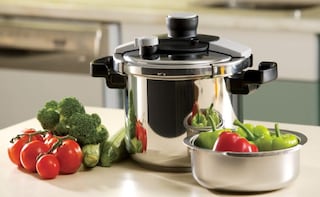Cooking is an art and to perfect your skills, you must use the right utensils and the right techniques. It is believed that slow-cooking is one of the healthiest forms of cooking perhaps better than quick methods like pressure cooking. Before you ascertain which one is better, it is important to know how pressure cooking differs from open cooking in terms of the technique as well as their effects on the nutritional value of the food.How does pressure cooking work?
How is open cooking different?In case of open cooking, it all depends on the type of pot you use to cook the food. It can be a deep or a shallow skillet. In a shallow skillet, since the food is more exposed, the moisture is lost more easily than in deeper pots and the food tends to become dry. It takes slightly longer to cook in deeper pots as the water does not get enough surface area to evaporate but it is a better cooking method because the food retains its moisture and flavor. If the pan or the utensil is covered with a lid it has the same effect as a pressure cooker which is that vegetables may break down easily and lose liquid. The lid will allow the steam arising to be captured and the steam does the cooking.Pressure Cooking Versus Open Cooking
Advertisement
For the latest food news, health tips and recipes, like us on Facebook or follow us on Twitter and YouTube.
Advertisement
